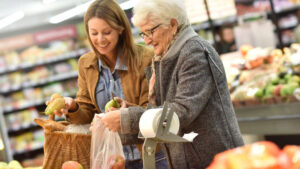Home » Commentary » Opinion » Taking toll on society
· Ideas@TheCentre

 Australian governments are working hard to manage the economic impact of COVID-19 and to ensure health care is there for all who need it. But the virus is taking its toll in other ways.
Australian governments are working hard to manage the economic impact of COVID-19 and to ensure health care is there for all who need it. But the virus is taking its toll in other ways.
We do not appear to be doing well under the strain of what the American writer Walter Russell Mead has described as “a Jet Age pandemic” racing through the global economy.
Earlier this week, some of our leading grocery stores took full page advertisements in newspapers asking us all, in effect, to cool it.
Panic buying, aggressive behaviour towards shop workers, and even shoppers coming to blows over toilet paper are all revealing an ugly side of our Aussie temperament.
We are not the only ones feeling the strain, of course. Plenty of fraudsters are exploiting fear by pedlling quack remedies and potions claiming to ward off, or even cure, the virus.
And where there are fake remedies, there are also conspiracy theories that purport to explain and blame what is happening around the world, as Daniel Pipes notes.
But in the rush to save ourselves, we are in danger of losing sight of the needs of our neighbours, many of whom are more vulnerable and less able to fend for themselves.
And faced with scarce health resources and mounting demand, how is it, asks theologian Ephraim Radner, that a person’s value has reduced to the triage calculation of medical costs.
It’s time to take a leaf out of the Baby Boomers’ book to get a grip, and keep things in perspective. Following government advice and taking all sensible precautions is essential.
Travel bans, self-quarantines, and a heightened public health awareness are all important and. They will make a difference in the effort to slow down progress of the virus.
But as the Daily Telegraph’s Warren Brown reminds us, we also need to keep our sense of humour. We’ve faced tough times before. Sticking together will see us all through this crisis.
There is a lot we still do not know about COVID-19. Scientists are researching a vaccine, but circumventing adequate clinical trials in a rush to use is unwise and dangerous.
Politicians framing guidelines for us are, themselves, heavily dependent on medical advice which is, itself, changing all the time and often amounts to a highly educated guess.
Social isolation, disrupted routines, and the likelihood of economic hardship for all of us are bound to take their toll on our physical and mental health in coming months.
In the face of such uncertainty, how are we to live? First, we must recognise there is a lot we don’t know about COVID-19. Second, we must resist the urge to panic.
Whilst not being complacent about the virus, and being sure to observe public health guidelines, we also need to check the fear that arises from speculation and rumour.
As Victor Davis Hanson has urged, “humility, certainty – and much less accusation and panic – should be the order of the day.”
We need to cultivate the capacity to live calmly in the face of what we do not know. It’s one of our national traits that makes Australia the envy of so many other countries.
Admired for our egalitarian spirit of optimism and a reluctance to take ourselves too seriously, now is the time – like no other – for us to hold fast to our sense of mateship.
Taking toll on society